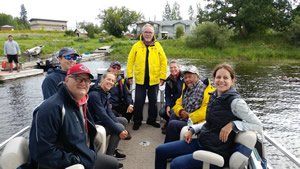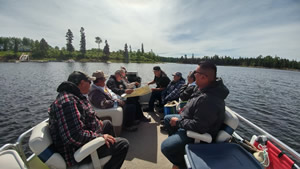Seeding Food Innovation - Awarded Project 2019
Intensifying Manomin (Zizania palustris) Growth in Environments Altered by Colonial Settlement in Ways that are Responsive to Anishinaabe Knowledge and Values
Project Description

Manomin, also known as wild rice, grows in water and is maintained by Indigenous harvesters. For generations, the plant was a staple in Indigenous diets and an important source of food and habitat for animals.
The Anishinaabe people and others associate a drastic decline in manomin growing in the bays along the Upper Winnipeg River with changes in land use, altered water levels due to the construction and operation of hydropower dams, and the introduction of pollutants and invasive species after World War II. This two-year project investigates the activities and conditions affecting manomin productivity in partnership with Niisaachewan Anishinaabe Nation. The Manomin Research Project will develop strategies to restore wetlands that support manomin growth.

Agricultural intensification in northwestern Ontario is challenging because of climate, soils, and other factors. Our success will demonstrate that food production can be increased by restoring wetlands and using water and nutrients already available in the system. This type of solution to agricultural intensification is essential for feeding the globe’s growing population while protecting the health of the planet.
Food Innovation
The Manomin Research Project will raise awareness of the nutritional and economic value of manomin while revitalizing cultural practices associated with growing, processing, and eating it. Public events co-hosted by academic researchers and community members facilitate intergenerational knowledge transmission. They also help to heal the generation gap created when children were forced into residential schools by federal agents and lost the opportunity to learn about manomin from cultural educators during harvesting season.
To restore crops and revitalize cultural activities, we have developed an interdisciplinary, collaborative, and community-engaged approach to research. Historic and cultural knowledge is intertwined with field data collected by community and university partners. Multi-disciplinary academic researchers and Indigenous knowledge keepers co-construct meaning from project findings in order to co-develop a culturally appropriate management strategy. The strategy will explore management of water levels and invasive wetland plants and practices for seeding and harvesting manomin.
Outcome
The study approach and findings are expected to have relevance throughout northwestern Ontario and adjacent areas, with good opportunities to stimulate agricultural intensification generally while addressing economic and food insecurity and serving cultural revitalization initiatives in Anishinaabe communities specifically.
The strategy to restore manomin crops may require action by other stakeholders that influence environmental conditions at Niisaachewan Anishinaabe Nation. The project outcomes will be shared with these stakeholders to initiate dialogue about living, more sustainably, together.
Grantees:

Dr. Andrea Bradford
Dr. Andrea Bradford obtained her Ph.D. from Queen's University at Kingston in 1999. Her dissertation addressed the water balance and hydroecology of Minesing Swamp, near Barrie, Ontario. She has had five years’ experience in environmental consulting and two years’ experience in the Water Policy Branch of the Ontario
» More Info

Dr. Brittany Luby
Prof. Brittany Luby is an award-winning researcher who originates from Treaty #3 in what is now known as northwestern Ontario. Luby seeks to stimulate public discussion of Indigenous issues through her critical and creative work. The Canadian Historical Association has described Luby’s research as “innovative in
» More Info

Dr. Ralph Martin
Prof. Ralph Martin's approach to sustainable food production is to produce enough food to meet dietary needs today, while preserving productive capacity for future generations of people and other species. This is within the context of healthy soil, clean air and water, and regenerative energy to support resilient farming
» More Info

Chief Lorraine Cobiness
Lorraine Cobiness has over a decade of experience as Chief of Niisaachewan First Nation. She will continue to oversee the Manomin Research Project. From her position, Cobiness will set research priorities, review progress reports, and establish objectives for research dissemination and use. She has experience
» More Info

Mr. Barry Henry
Barry Henry is the Economic Development Officer (EDO) at Niisaachewan First Nation. As such, Henry assists in the development of plans for the use of traditional lands by community members. The Manomin Research Project is one such initiative as field restoration would stimulate agri-business on reserve.
» More Info

Mr. Allan Luby
Allan Luby is a band member, federally-licensed captain, and expert navigator. He has been President of Lake Navigation Ltd., which operates a 200-passenger capacity vessel, since 1987. Luby has agreed to share his water expertise with the Manomin Research Project by maintaining boating equipment and acting as
» More Info

Mr. Joe Barnes
Joe Barnes was born in Southern Ontario and now resides in Kenora. He is presently the Executive Director of Kenora Chiefs Advisory, an organization that provides Mental Health Services and other community Health and Social Service Program supports to First Nation Communities. Barnes has a Diploma in Social
» More Info
[Back]